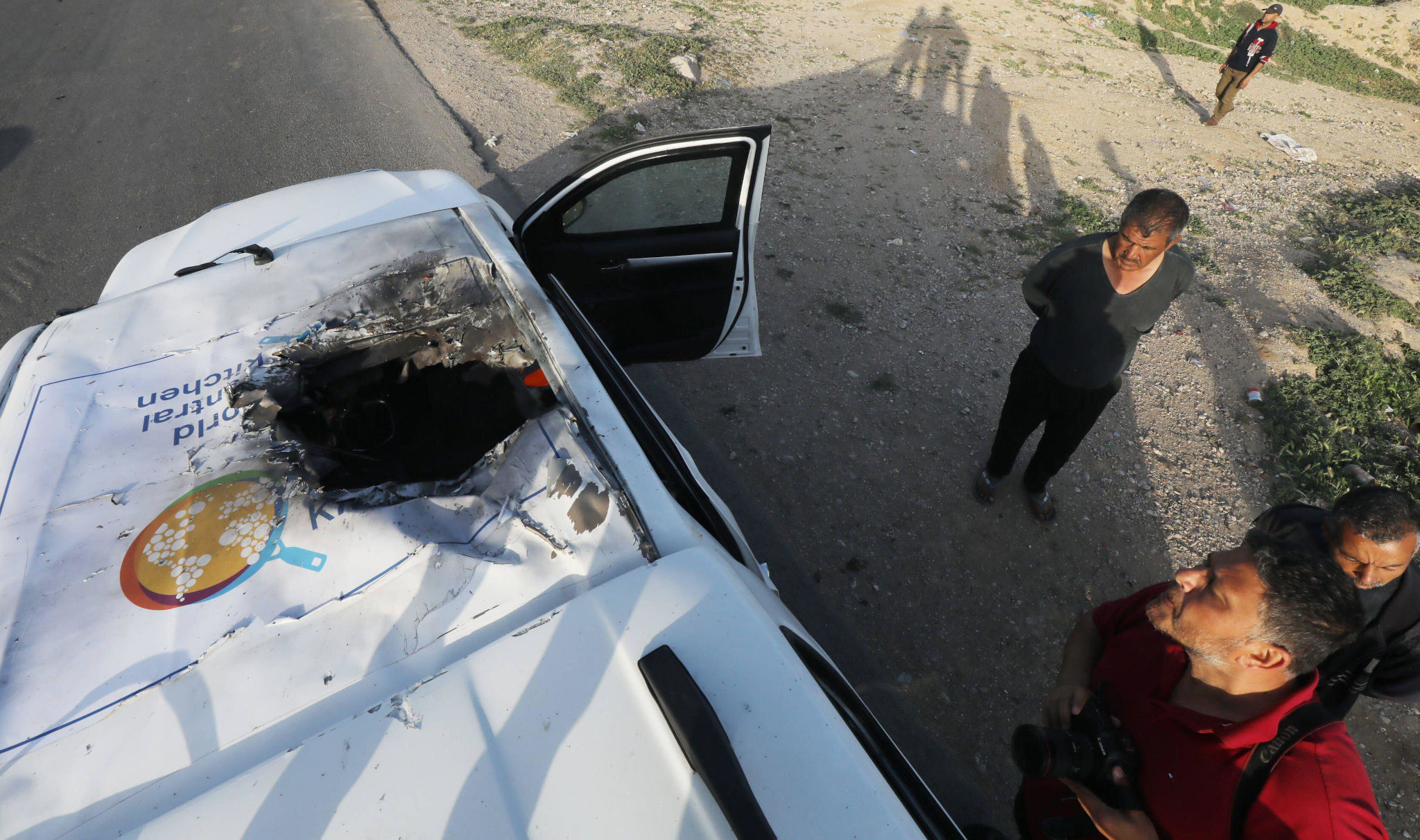On 1 April, Israeli forces launched a series of airstrikes on a convoy of aid workers in Gaza, killing three Britons, a Polish national, a Palestinian, an American-Canadian dual citizen, and an Australian.
The Israeli Air Force carried out the bombing with a Hermes 450 drone. According to Campaign Against the Arms Trade, this drone may be powered by a R902(W) Wankel engine produced in Britain by UAV Engines Limited (UEL).
New court documents show that the UK government decided to continue arms exports to Israel on 8 April, one week after the strike on the aid workers who were employed by the charity World Central Kitchen (WCK).
The revelation will put additional pressure on the Foreign Office to justify its decision not to suspend arms sales to Israel.
‘Killed with British weapons’
Global Legal Action Network (GLAN) and Palestinian human rights group Al-Haq challenged the UK government today in court over arms sales to Israel.
Documents provided to the court show that the UK government has conducted five legal assessments of the situation in Gaza since 18 December.
One of those assessments, which covered the period 18 December to 29 February, was delivered to UK foreign secretary David Cameron on 28 March.
On 3 April, two days after the Israeli airstrike on the aid workers, Cameron used this assessment to recommend that the UK continue arms sales to Israel.
Five days later, UK trade secretary Kemi Badenoch authorised the continuation of extant licences and new licences to Israel, according to GLAN’s press statement.
The court documents further show that the UK government is capable of making “out of cycle assessments… where circumstances require” on Israel’s compliance with international humanitarian law.
However, such an assessment was apparently not conducted following Israel’s attack on the WCK staff.
Charlotte Andrews-Briscoe, a lawyer at GLAN, said: “The world has watched as 34,000 people have been killed, and more are being killed every day… Has the Government no regard for the immense loss of human life thus far, some of whom will have been killed with British weapons?”
Hermes 450 drone
The UK government is also refusing to rule out whether British machinery was used in the killing of the aid workers.
On 12 April, Kenny MacAskill MP asked in parliament whether the government had made an assessment of whether UEL engines or engine parts had been used in the strike. Trade minister Alan Mak said his department could not comment “on specific licences”.
On 17 April, Andy McDonald MP also asked whether the three British aid workers “were killed by weapons manufactured in Britain”. Foreign Office minister David Rutley responded simply that “we have strong export controls”.
UEL designs and manufactures engines for drones, specialising in Wankel technology which delivers an “outstanding power-to-size and weight ratio… ideal for tactical unmanned aircrafts”.
The company was established in Staffordshire in 1992, before being acquired by Israeli arms firm Elbit Systems.
Over recent decades, concerns have been raised that UEL produces engines and engine parts for Israel’s drone fleet, which is frequently used to support bombing campaigns over Gaza.
Made in Britain
In 2009, it was reported that the engines for Israel’s Hermes 450 drone had been manufactured by UEL. These claims were supported by information on Elbit’s own website.
British arms control officials subsequently admitted that they had licensed engines to Israel for onward export, but could not confirm that the engines had not instead been fitted to the Hermes 450 drone.
Since then, the UK government has continued to issue licences to UEL for exports to Israel. The most recent licence was seemingly granted in 2021, allowing UEL to export parts for military engines to Israel.
Campaign Against the Arms Trade’s Sam Perlo Freeman told Middle East Eye: “The evidence seems to stack up that it is a UK engine and, if it’s not, then Elbit need to clarify that… Definitely it seems to be based on a UK design at the very least”.
An Elbit Systems spokesperson told Declassified: “Elbit Systems UK, its subsidiaries and joint ventures, including UAV Engines Limited and U-Tacs, are not involved in the Hermes 450 programme”.
The company’s spokesperson, however, would not respond to a further question on whether Israel’s Hermes 450 drones use engines or engine parts produced by UEL in the UK. They said: “We have nothing further to add to the [previous] statement”.
A UK-based subsidiary of Elbit Systems and Thales also produces the Watchkeeper drone, which is modelled on Elbit’s Hermes 450 and used by the British army.
“The British government is, in effect, buying technology that has been ‘field tested’ on Palestinians”, noted campaign group War on Want.
‘A full, transparent explanation’
The day after the Israeli airstrikes on the aid convoy, UK foreign secretary David Cameron announced that he had “called on Israel to immediately investigate and provide a full, transparent explanation of what happened”.
On 5 April, the IDF published the conclusions of its investigation, claiming that Israeli forces had identified gunmen near the trucks and “mistakenly assumed that the gunmen were located inside the accompanying vehicles and that these were Hamas terrorists”.
The report continued: “Those who approved the strike were convinced that they were targeting armed Hamas operatives and not WCK employees”. The IDF chief of the general staff subsequently dismissed the Israeli brigade’s commander and chief of staff.
Israel’s self-exonerating investigation was led by Yoav Har-Even, the former head of the IDF operations directorate, and now the president and CEO of Rafael Advanced Defense Systems.
Rafael is one of Israel’s biggest arms firms. It is owned and controlled by the Israeli state, and its largest client is the IDF. The investigation into the killing of the aid workers was therefore led by the CEO of a company which supplies many of the bombs that Israel is using to destroy Gaza.
The UK government has not commented on whether this satisfies its demand for a “full, transparent explanation”, and the extent to which the Foreign Office is pressing Israel on the matter remains unclear.
Mak recently told parliament: “We are carefully reviewing initial findings of Israel’s investigations into the killing”. He continued: “The findings of the inquiry must be published in full and followed up with a wholly independent review to ensure the utmost transparency and accountability”.
Prior to the attack on the WCK staff, at least 357 humanitarian-run sites in Gaza had reportedly been attacked.




